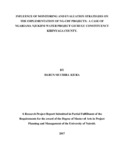Influence of Monitoring and Evaluation Strategies on the Implementation of Ng-cdf Projects: a Case of Ngariama Njukiini Water Project Gichugu Constituency Kirinyaga County
Abstract
The purpose of this study was to assess the influence of monitoring and evaluation strategies on the implementation of NG-CDF projects in Ngariama Njukiini water project in Gichugu constituency, Kirinyaga County. The study sought to determine the influence of stakeholder involvement, monitoring and evaluation result, strength of monitoring and evaluation team, and finally frequency of the monitoring and evaluation on the implementation of NG-CDF projects in Gichugu constituency. The study employed a descriptive survey design and a correlation design. The study targeted 1200 beneficiaries and 79 committee members of Ngariama Njukiini water project. The study sampled a total of 144 respondents through stratified random sampling. Primary data was collected using structured questionnaires and interviews. Secondary data was collected through reviews of both empirical and theoretical data from books, journals, magazine and the internet. Data collected was then tabulated and analyzed for purpose of clarity, with the aid of SPSS version 20 software. The data was presented using tables, mean, and frequencies. Majority of the respondents stated that Stakeholder involvement, utilization of M&E result, strength of M&E teams and frequency of M&E activities influenced implementation of CDF projects to a very great extent. The study concluded that monitoring and Evaluation strategies should be properly formulated and adhered to. M&E strategies should be part of strategies used to implement projects .Involvement of stakeholders during monitoring provides information necessary in making management decisions and that makes human and resource mobilization for CDF project implementation easier. It is recommended that there is need to include all stakeholders in project M & E at each stage as they play an active role since they are the consumers of the project for the sake of sustainability. Cooperation of stakeholders should also be encouraged. All the stakeholders need to be clearly identified and their requirements documented. Each of the stakeholders’ requirements needs to be prioritized and focus placed on those that are most critical to success
Publisher
University of Nairobi
Rights
Attribution-NonCommercial-NoDerivs 3.0 United StatesUsage Rights
http://creativecommons.org/licenses/by-nc-nd/3.0/us/Collections
- Faculty of Education (FEd) [6022]
The following license files are associated with this item:


